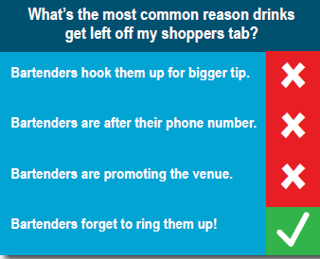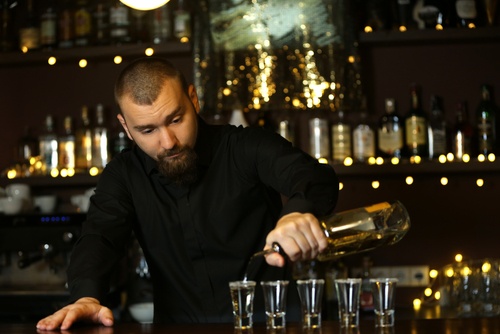I think it's fair to say most bartenders are confident by nature-- projecting confidence, at least, is implicitly part of their job description. Confidence is desirable to a degree, of course, but when it crosses the line to cockiness or worse it can become problematic, not only to the patrons a cocky bartender inevitably off-puts, but because of squandered profits as well. An obvious example is the lack of urgency all too many bartenders have when it comes to ringing up transactions, begging the question: Whats the most common reason drinks get left off my secret shopper's tab?

Yes, they simply forget, and it's clear to my secret shoppers it was an oversight, not a deliberate act. I'd say this happens in about one out of every five reports our shoppers submit. That's 20% of the time at least one drink, more often an entire round, gets inadvertently left off a shopper's tab!
A bit off-screen math translates that into about 7% of the actual drinks made, which, at an average of let's say, $8.00 a drink (more in larger metro areas), equals in the range of 1K in lost revenue (this is pure retail loss) a week for a place doing 10-20K in beverage revenue a week. This number is much higher when you factor in the profit lost by over-pouring and outright theft, more in the 25% range, meaning one out of every four drinks is unaccounted for in sales.
That's a ridiculous amount of lost revenue for an act that, unlike a deliberate comp, doesn't serve to promote the venue or encourage return patronage in any way.
Why does this happen?
Bartenders aren't stupid (most of them aren't): they're over-confident, in particular about their memory. Too many of them are prone to:
1. When it's busy...take too many orders before finally getting to the register to update tabs.
2. When it's slow...delay updating tabs, often until the final check is requested.
In each case, the bartender is over-relying on their memory, which too often results in oversight. The simple solution is to always, without exception, ring up an order as soon as you have an opening.
When it's slow this is a pretty straightforward proposition: Immediately after a running tab order is delivered, it's updated on the POS terminal. Not after another cup of coffee, not after all the fruit has been cut, not after answering a text...IMMEDIATELY.
The standard excuse for the delay: That it's so slow there's no way the order can later be forgotten, has been discredited in so many reports I've read that the utterance of it should be banned industry-wide.
When it's busier, things get a bit more complicated, especially when it's insanely busy, like five deep at the bar and everyone's apologetic, screaming for drinks. In this case, you'll get buried if you deal with just one order at a time, especially if you've got a lot of 1-2 round orders coming in, not to mention you'll appear plodding and amateurish to your rabble of parched customers. But unlike servers, you don't have the luxury of writing down orders, so the trick is to be realistic about what your short term memory capacity is: can you remember and handle making 5 drink at once? 7? 12? Always err on the side of taking too few orders, not too many. Don't try to pretend you can memorize the phone book, being over aggressive simply leads to having to go back for a reminder, or worse yet, making the wrong drinks and having to dump them and start all over again.
The reality is that short-term memory is quickly dislodged unless a conscious effort is made to transfer it to long term storage. In other words, if we turn out attention to other matters without sufficiently processing the information first, we'll probably lose it in less than a minute. Harvard Professor George Miller's seminal work in the 1950's (http://psychclassics.yorku.ca/Miller) found that the average number of items reflexively stored in interim working memory is 7 (+/-2). More recent studies have put the average number even lower, at 4-5. More than that is difficult, if not impossible, to retain without concerted effort.
If you take a professional approach to bartending, your capacity should rise over time, but even if it doesn't and you never surpass, say, the seven drinks at a time mark, that's much less of a handicap than if you regularly make mistakes and drop orders by being overaggressive. In my experience, the bartenders with the highest sales (and tip intake) are usually not the ones with the best memories, but the ones that simply move the fastest, particularly during the busiest times of the night, tirelessly going after drink orders yet at the same time making just enough conversation with customers to personalize their experience.
Complicating the capacity question is that you've got more than the drinks being shouted at you think about: there's drink orders piling up at the service well, a broken glass to clean up in front of you, a fight between customers to diffuse down the bar, food to pick up in the kitchen, etc. All these items are competing for your short-term memory storage as well. Don't neglect to prioritize them adequately by overly focusing on taking as many orders as possible.
The simplest way to increase your drink order capacity is to repeat orders back to customers after you receive them. Studies have shown that repeating a list aloud, as opposed to sub-vocally, increases retention significantly. You're also more likely to get the order specifics (i.e., garnishes, etc.) right every time you do!
So rather than spend a bunch of time practicing mnemonic techniques (although simple ones, like visually associating drinks with customers, can help), develop a rigid, dare I say humble system for taking and processing orders, one that becomes second nature over time. You should never have to think about when to ring up an order: it should happen automatically at the first opening. In the long run this approach will yield positive dividends for guests (who get the right drinks quickly), managers (who don't have to constantly void mis-orders), and owners (whose profit shrinkage is reduced), not to mention you, the bartender, who stands to increase sales and tips by a significant percentate as a result!
If you enjoyed this little bartender school sesh, check out this article about improving your tips or sign up for future posts.





.png)





